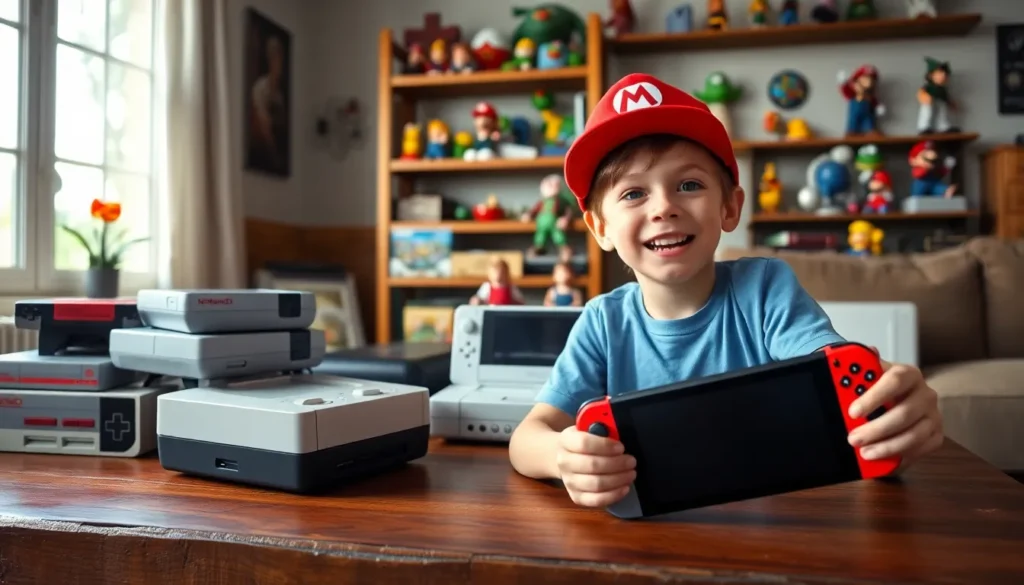Nintendo has been a pivotal player in the gaming industry for decades, shaping the way we play and experience video games. From its inception as a playing card company to a global leader in gaming, Nintendo’s journey is filled with groundbreaking innovations and beloved franchises. This article delves into the history and evolution of Nintendo, the impact of its iconic games, its contributions to game design, community engagement, and what the future holds for Nintendo enthusiasts. Join in as we explore the rich tapestry of Nintendo’s legacy and its significance in the world of gaming.
Table of Contents
ToggleA Brief History Of Nintendo’s Gaming Legacy

Nintendo’s history is a fascinating saga that dates back to 1889, when Fusajiro Yamauchi founded the company as a playing card manufacturer. Fast forward to the 1970s, Nintendo entered the video game arena, initially dabbling in arcade games like ‘Donkey Kong’ and ‘Duck Hunt’. But, it wasn’t until the release of the Nintendo Entertainment System (NES) in 1985 that the company truly revolutionized home gaming.
The Evolution Of Nintendo Consoles
The NES was a game changer, introducing players to an array of memorable titles like ‘Super Mario Bros.’ and ‘The Legend of Zelda’. The success of the NES paved the way for subsequent consoles, each marked by distinct innovations:
- Super Nintendo Entertainment System (SNES): Launched in the early 90s, it expanded on the NES’s legacy with enhanced graphics and sound, further enriching gameplay experiences.
- Nintendo 64: Known for introducing 3D graphics, titles like ‘Super Mario 64’ and ‘The Legend of Zelda: Ocarina of Time’ set new standards for game design.
- GameCube: Though it faced commercial challenges, it fostered beloved multiplayer experiences with games like ‘Super Smash Bros. Melee’.
- Wii: Breaking the mold, the Wii utilized motion controls, attracting a new demographic to gaming.
- Switch: The hybrid design of the Switch has shattered sales records, proving that Nintendo continues to adapt and innovate in the fast-paced world of gaming.
This evolution showcases how Nintendo has consistently embraced change, making it a staple in the gaming community.
Iconic Nintendo Franchises That Defined Gaming
Nintendo is synonymous with some of the most iconic franchises in gaming history. These franchises not only define Nintendo’s brand but also changed the gaming landscape.
The Impact Of Nintendo On The Gaming Industry
- Super Mario Series: The flagship franchise has sold over 368 million copies, introducing players to the concept of platforming and exploration.
- The Legend of Zelda: Known for its intricate gameplay and storytelling, this franchise has influenced countless action-adventure games.
- Pokémon: Fostering a global phenomenon, Pokémon introduced players to the concept of creature collection, battling, and trading, shaping mobile gaming and merchandise markets alike.
- Metroid: Pioneering the “Metroidvania” genre, it emphasized exploration in a non-linear format, inspiring many indie developers today.
- Smash Bros.: A crossover fighting game that brought various characters from different franchises, revolutionizing multiplayer gaming experiences.
Nintendo’s ability to create lasting franchises demonstrates its knack for blending gameplay mechanics with engaging narratives.
Nintendo’s Contribution To Game Design And Innovation
Nintendo has historically been at the forefront of game design, pushing the boundaries of what games can achieve.
Exploring Game Mechanics And User Experience
Nintendo’s approach has always focused on accessibility without compromising depth. The company has introduced countless innovations that have reshaped gaming:
- Game Design Philosophy: Nintendo games often emphasize player skill and understanding rather than sheer difficulty. Titles like ‘Dark Souls’ may excel in challenge, but games like ‘Super Mario’ prioritize learning through play.
- User Interface (UI): Nintendo prioritizes intuitive UIs, enabling players of all ages to navigate gameplay seamlessly.
- Multiplayer Experiences: Local multiplayer games have remained a staple of Nintendo consoles, fostering social interaction through competitive and co-op experiences.
- Health and Fitness: With the introduction of ‘Wii Fit’, Nintendo explored new gameplay mechanics that linked video game usage to physical health, making fitness part of the gaming experience.
These contributions showcase Nintendo’s innovative spirit, setting standards that many developers strive to achieve.
Community Engagement And The Nintendo Fanbase
One of Nintendo’s greatest assets is its passionate fanbase, deeply engaged in all aspects of the gaming experience.
The Role Of Nostalgia And Memory In Gaming
Nostalgia plays a crucial role in fostering this connection. Many gamers grew up with Nintendo, and their games are tied to fond memories:
- Shared Experiences: From family game nights to multiplayer sessions with friends, Nintendo builds experiences that transcend generations.
- Fan Communities: Online forums and fan art have fostered a sense of belonging among players, providing platforms to share memories and discuss strategies.
- Events and Announcements: Nintendo Direct presentations have become events in their own right, with fans eagerly awaiting news on new releases and franchise updates.
This sense of community helps Nintendo maintain a loyal customer base, ensuring the brand’s longevity.
What The Future Holds For Nintendo Archives
Looking ahead, the future of Nintendo Archives appears promising. The company has shown signs of embracing digital preservation and new content approaches, such as:
- Virtual Reality: With the rise of VR technology, Nintendo could harness this innovation to create immersive experiences, potentially for franchises like ‘Zelda’ or ‘Mario’.
- Cloud Gaming: As gaming shifts toward a services model, Nintendo may explore cloud capabilities, ensuring accessibility without hardware constraints.
- Mobile Gaming Expansion: Following the success of titles like ‘Mario Kart Tour’, more integration of Nintendo’s classics into mobile platforms could further broaden their reach.
As the gaming landscape continues to evolve, Nintendo’s commitment to nostalgia and innovation ensures it will remain a key player.
Conclusion
Nintendo’s legacy is a testament to the power of creativity, community, and innovation in the gaming world. From its early days in the playing card business to its status as a gaming giant, Nintendo has continuously shaped how we play and interact with games. As they look to the future, it’s clear that the company remains committed to honoring its rich history while innovating for the next generation of gamers. Regardless of what’s next, the Nintendo Archives will continue to be a treasure trove of gaming culture and experiences.




